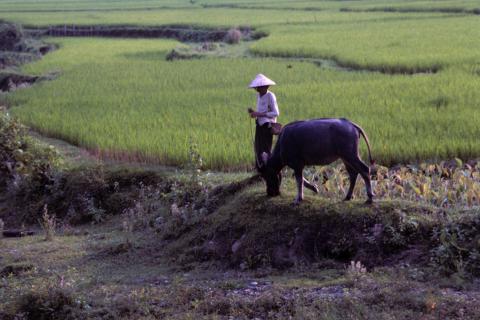
852094800
A person in a sunhat walks a water buffalo by wet-rice fields in Mai Chau. The farmer and young buffalo are walking on earthen dykes constructed both as dry paths and as walls to contain standing water needed by the rice plants during certain stages of their growth. Water buffalo are used to pull plows that turn soil in preparation for the planting of wet-rice fields. They also are sometimes eaten at major community feasts. Traditionally, buffalo were a major source of wealth for Southeast Asian families.
This region is home to ethnic minorities sometimes known as “hill tribes” or Montagnards (mountain people) in Vietnam. In this part of northern Vietnam, the highland minority groups are mostly speakers of Tai languages, historically related to the current majority populations of Laos and Thailand.
In Vietnam, some of the highland ethnic minorities are wet-rice farmers, unlike what is generally the case in most of the rest of Southeast Asia. In most other regions, the highlands are too dry or steep to construct the standing water pools required to nourish wet rice. Therefore, most Southeast Asian highlanders plant a different rice variety called “dry rice,” which can grow on hillsides only fed by seasonal rains.
Highland ethnic minorities in Vietnam now often wear similar clothing styles to the lowland Vietnamese majority group. Until the recent growth of foreign tourism, which has made ethnic minority regions and crafts more economically valuable, the roughly fifty small ethnic minorities of Vietnam did their best to shed their traditional ethnic clothes and distinctive traits.
Creative Commons BY-NC-SA
 852094800
852094800